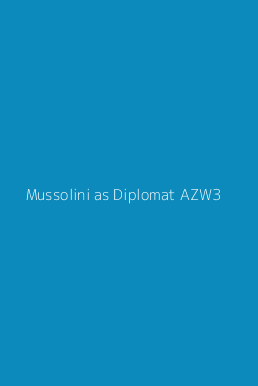Downloading Mussolini as Diplomat AZW3

Was Mussolini’s alliance with Hitler foreordained? Could Italy have been kept out of the Second World War? Did the policy of England’s Anthony Eden really push Mussolini into Hitler’s arms instead of luring him back to his former policy of friendship with Great Britain?
These are some of the intriguing questions which historian Richard Lamb asks about the Italian dictator’s foreign policy toward Germany, on the one hand, and Britain and France on the other before he plunged his country into the disastrous alliance with Hitler. Surprisingly, Mussolini began with a deep distrust of Hitler and feelings of friendship toward England as well as France, Italy’s World War I allies he hoped might stand up to Hitler’s aggressive intent. He despised Hitler’s antisemitism.
In the early years of his rule, he was greatly influenced by his mistress Margherita Sarfatti, a Jewish intellectual who tried to keep Mussolini from plunging into his military adventures in Abyssinia. In England, many of the country’s Conservative leaders, including Churchill, Chamberlain, even Lloyd George, held Mussolini in high esteem. Lamb reveals the secret records of an international conference Mussolini organized in 1935 in Stresa to present a united front with Britain and France against German rearmament, and to enlist Anglo-French support for Austria against Nazi aggression.
But a meeting between Mussolini and Anthony Eden after Stresa went so badly that Eden developed a personal dislike for Mussolini that almost amounted to a vendetta. Eventually it was Eden — who much later had to resign as British Prime Minister because of Suez — who drove Mussolini into Hitler’s arms, Lamb says. From then on British policy of appeasing Hitler and opposing Mussolini was disastrous, leading directly to World War II.
Lamb’s revisionist assessment of Mussolini’s diplomatic blunders in his relations to the other European powers is based on British and Italian documents finally released after more than half a century. Mussolini as Diplomat is an indispensable new look at crucial events leading to World War II by a leading historian.
“Mr. Lamb’s research is meticulous, and he has produced compelling new evidence that thoroughly alters previously held perceptions of this oppressive period of Italian history.”—Carlo D’Este, The New York Times Book Review
“All historians will be deeply in his debt . . . he has established a unique reputation as a scholarly and independent historian with little respect for conventional wisdom. He has now written an important and very remarkable book, from which no one emerges very well.’—Michael Howard, The Times (London)
“A book abounding with new information and facts . . . of which even readers who went the length of the Italian campaign are likely to be unaware.”—Norman Lewis, Literary Review
“All too infrequently a military history is published that, conforming to the highest standards of scholarship, comprehensively rewrites a known passage of warfare. [This] is unquestionably such a book . . . No one with a serious interest either in Italy’s war or contemporary Italian society can afford to ignore it.”—Justin Wintle, Financial Times
“Rarely has an Anglo-Saxon scholar told with greater understanding our tribulations, our guilt, the depths to which we sank and our glory.”—Mario Ciriello, La Stampa
RICHARD LAMB is an eminent historian with eight books to his credit, including the highly praised War in Italy 1943–1945: A Brutal Story, which was a New York Times Notable Book of the Year and was short-listed for the Duff Cooper Prize. Lamb served with the British Eighth Army in Italy during World War II.
These are some of the intriguing questions which historian Richard Lamb asks about the Italian dictator’s foreign policy toward Germany, on the one hand, and Britain and France on the other before he plunged his country into the disastrous alliance with Hitler. Surprisingly, Mussolini began with a deep distrust of Hitler and feelings of friendship toward England as well as France, Italy’s World War I allies he hoped might stand up to Hitler’s aggressive intent. He despised Hitler’s antisemitism.
In the early years of his rule, he was greatly influenced by his mistress Margherita Sarfatti, a Jewish intellectual who tried to keep Mussolini from plunging into his military adventures in Abyssinia. In England, many of the country’s Conservative leaders, including Churchill, Chamberlain, even Lloyd George, held Mussolini in high esteem. Lamb reveals the secret records of an international conference Mussolini organized in 1935 in Stresa to present a united front with Britain and France against German rearmament, and to enlist Anglo-French support for Austria against Nazi aggression.
But a meeting between Mussolini and Anthony Eden after Stresa went so badly that Eden developed a personal dislike for Mussolini that almost amounted to a vendetta. Eventually it was Eden — who much later had to resign as British Prime Minister because of Suez — who drove Mussolini into Hitler’s arms, Lamb says. From then on British policy of appeasing Hitler and opposing Mussolini was disastrous, leading directly to World War II.
Lamb’s revisionist assessment of Mussolini’s diplomatic blunders in his relations to the other European powers is based on British and Italian documents finally released after more than half a century. Mussolini as Diplomat is an indispensable new look at crucial events leading to World War II by a leading historian.
PRAISE FOR RICHARD LAMB’S WAR IN ITALY
(shortlisted for the Duff Cooper Prize)“Mr. Lamb’s research is meticulous, and he has produced compelling new evidence that thoroughly alters previously held perceptions of this oppressive period of Italian history.”—Carlo D’Este, The New York Times Book Review
“All historians will be deeply in his debt . . . he has established a unique reputation as a scholarly and independent historian with little respect for conventional wisdom. He has now written an important and very remarkable book, from which no one emerges very well.’—Michael Howard, The Times (London)
“A book abounding with new information and facts . . . of which even readers who went the length of the Italian campaign are likely to be unaware.”—Norman Lewis, Literary Review
“All too infrequently a military history is published that, conforming to the highest standards of scholarship, comprehensively rewrites a known passage of warfare. [This] is unquestionably such a book . . . No one with a serious interest either in Italy’s war or contemporary Italian society can afford to ignore it.”—Justin Wintle, Financial Times
“Rarely has an Anglo-Saxon scholar told with greater understanding our tribulations, our guilt, the depths to which we sank and our glory.”—Mario Ciriello, La Stampa
RICHARD LAMB is an eminent historian with eight books to his credit, including the highly praised War in Italy 1943–1945: A Brutal Story, which was a New York Times Notable Book of the Year and was short-listed for the Duff Cooper Prize. Lamb served with the British Eighth Army in Italy during World War II.
